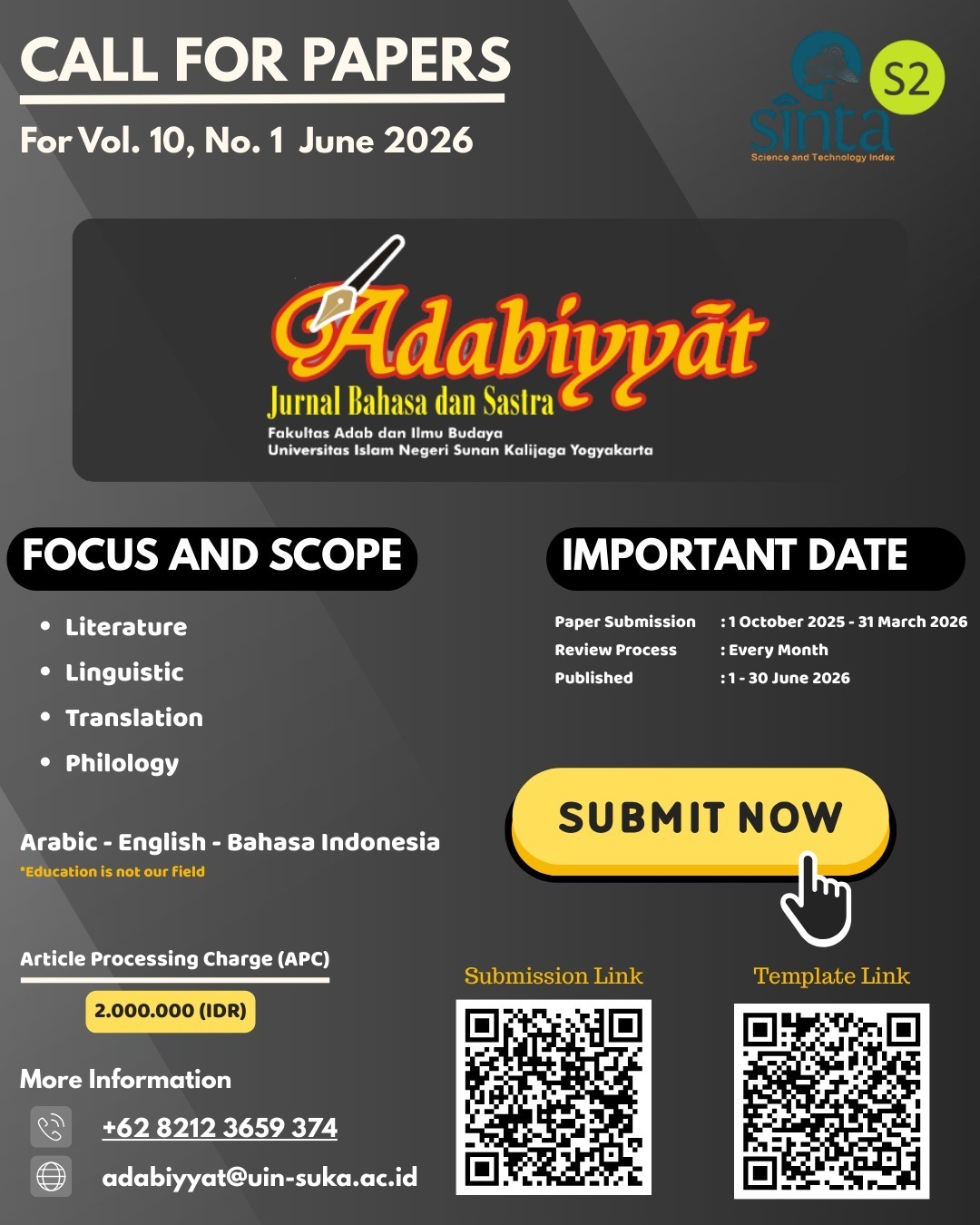POTRET PERJUANGAN PEREMPUAN OLEH ISRA HADID DAN DEYA RA’AD DALAM A WOMAN IS NO MAN KARYA ETAF RUM
DOI:
https://doi.org/10.14421/ajbs.2022.06102Keywords:
Islamic feminism, women’s struggle, gender equalityAbstract
A Women Is No Man presents the struggle of Isra Hadid and Deya Ra’ad to break the gender hierarchy in the family wrapped in religious dogma and try to regain their rights and freedoms as human women. Religion in this story becomes a legitimator for those main characters’ families to justify the practice of patriarchy in their traditions. Thus, the same oppression experienced by those two main female characters from different generations and growing up in different countries continues. By using the theory of Islamic feminism proposed by Wadud, the struggles experienced by Isra Hadid and Deya Ra’ad show the injustice between men’s and women’s positions in their tradition marginalizing and exploiting women, which does not exist in the understanding of Islam. This study applies the Narratology method to reveal the struggles of the two female characters by re-reading religious texts in reproducing meaning through Amina Wadud’s Islamic feminism. Islamic feminism theory is a theory that focuses on equality between men and women in Islam. Islamic feminism by Wadud tries to explain misconceptions about the status and role of women in Islam through re-reading the Qur’an and Hadith from a woman’s perspective. The results obtained from the study conclude that the inequality in the status and role of women in the Isra and Deya’s family traditions still continues to the next generation, although the intensity is reduced.
Downloads
References
Ahmad, Sheikh Idris, dan Farhana Tak. 2020. “A Study of Women Education in Islam: Barriers and Recommendations.” Indonesian Journal of Interdisciplinary Islamic Studies 4 (1): 19–34. https://doi.org/10.20885/ijiis.vol4.iss1.art2.
Anirah, Andi, dan Ibrahim Nasbih. 2020. “Jihad in The Perspective of Al-Qur’an.” Jurnal Diskursus Islam 8 (2): 133–43. https://doi.org/10.24252/jdi.v8i2.15514.
Bal, M. 2009. Narratology: Introduction to The Theory of Narrative. 3 ed. Toronto, Canada: University of Toronto Press.
Barry, Barnes. 2000. Understanding Agency: Social Theory and Responsible Action. London: SAGE Publications.
Engineer, Asghar Ali. 2004. The Rights of Women in Islam. New Delhi: New Dawn Press Group.
Jawad, Haifaa. 2003. “Muslim Feminism: A Case Study of Amina Wadud’s ‘Qur’an and Woman.’” Islamic Studies 42 (1): 107–25.
Khoiriyah, Wilda. 2019. “The Portrayal of Woman’s Struggle in Qaishra Shahraz’s Zemindar’s Wife.” Skripsi, Yogyakarta: UIN Sunan Kalijaga. https://digilib.uin-suka.ac.id/id/eprint/35086/.
Musawah Knowledge Building. 2015. Men in Charge? Rethinking Authority in Muslim Legal Tradition. Disunting oleh Ziba Mir-Hosseini, Mulki Al-Sharmani, dan Jana Rumminger. A Oneworld Book. London: Oneworld Publications.
Rum, Etaf. 2019. A Woman Is No Man. First edition. New York: Harper.
Salvianny, Frisky Nur, dan Eka Nurcahyani. 2020. “Women’s Resistance Towards Oppression in Etaf Rum’s a Woman Is No Man.” OKARA: Jurnal Bahasa Dan Sastra 14 (2): 239–54. https://doi.org/10.19105/ojbs.v14i2.3847.
Sari, Alfatih Nur Indah. 2020. “Patriarchal Oppression to The Main Characters in Etaf Rum’s a Woman Is No Man.” Undergraduate, Malang: Universitas Islam Negeri Maulana Malik Ibrahim. http://etheses.uin-malang.ac.id/21820/.
Velloso, Agustín. 1996. “Women, Society and Education in Palestine.” International Review of Education / Internationale Zeitschrift für Erziehungswissenschaft / Revue Internationale de l’Education 42 (5): 524–30.
Wadud, Amina. 1999. Qur’an and Woman: Rereading the Sacred Text from a Woman’s Perspective. New York: Oxford University Press.
———. 2006. Inside The Gender Jihad: Women’s Reform in Islam. USA: Oneworld Publications.
Downloads
Published
Issue
Section
License
Copyright (c) 2022 Rihaadatul 'Aisyil Mubarokati

This work is licensed under a Creative Commons Attribution-ShareAlike 4.0 International License.
- Adabiyyāt: Jurnal Bahasa dan Sastra publishes all articles entirely in full text.
- It is permissible for readers to download and to use it for scientific purposes and scientific dissemination.
- The author can re-publish the article that has been published by the Adabiyyāt: Jurnal Bahasa dan Sastra after obtaining written permission from the editor. This letter can be obtained by submitting a request letter for permission to republish the article to Adabiyyāt: Jurnal Bahasa dan Sastra via email adabiyyat@uin-suka.ac.id. In the second publication, the author is required to include information that the article was firstly published by the Adabiyyāt: Jurnal Bahasa dan Sastra.









